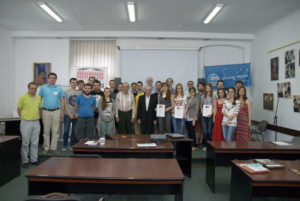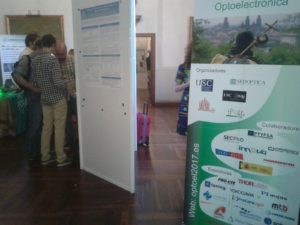 This year the OPTOEL congress (Spanish Congress of Optoelectronic) was held in Santiago de Compostela from the 12th to the 14th of July. It was organized by our University (Universidade de Santiago de Compostela) and, in particular, by the Photonics4Life research group where most of the members of the Young Minds Section are doing their PhD studies. The members of the Section were actively participating in the organization of the congress and with the help of the funding received with the grant “EPSYM2017A32-200€”. The money of the grant was used to print some advertisement of the chapter and with a contribution into the congress. Moreover we became officially part of the organizators of the congress with our economical contribution plus the work of the YM Section. We made a special effort in getting involved the youngest members of the group, so we introduce them in the leading role of managing a congress and giving support to the main organizers.
This year the OPTOEL congress (Spanish Congress of Optoelectronic) was held in Santiago de Compostela from the 12th to the 14th of July. It was organized by our University (Universidade de Santiago de Compostela) and, in particular, by the Photonics4Life research group where most of the members of the Young Minds Section are doing their PhD studies. The members of the Section were actively participating in the organization of the congress and with the help of the funding received with the grant “EPSYM2017A32-200€”. The money of the grant was used to print some advertisement of the chapter and with a contribution into the congress. Moreover we became officially part of the organizators of the congress with our economical contribution plus the work of the YM Section. We made a special effort in getting involved the youngest members of the group, so we introduce them in the leading role of managing a congress and giving support to the main organizers.
Specifically the YM Section was in charge of the reception and check-in of all the investigators plus giving any advice about the city. Finally we also participate in the congress giving some technical support like printing information panels or preparing the attendees’ gift.
As a section we believe that taking part of the organization of the OPTOEL 2017 allow us to improve key features in our following careers. We were able to improve our networking with some colleagues from other sections and to give more visibility to this kind of young students group.
Physics pizza party season 4
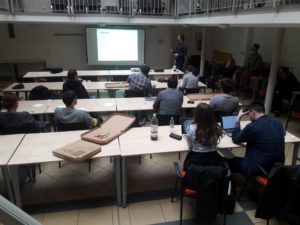 Since one of the main goals of EPS Young Minds project is to connect young scientists among different physics fields, Prague section decided to organize students’ colloquiums named Physics Pizza Party: Students 4 students, where young scientists from different universities and research fields presented their research activities. These events prove to be very successful for three subsequent semesters: winter 2016, summer 2016 and winter 2017.
Since one of the main goals of EPS Young Minds project is to connect young scientists among different physics fields, Prague section decided to organize students’ colloquiums named Physics Pizza Party: Students 4 students, where young scientists from different universities and research fields presented their research activities. These events prove to be very successful for three subsequent semesters: winter 2016, summer 2016 and winter 2017.
This semester we organized totally of four colloquiums. Three talks were from the research fields and one talk from the industry. Research talks presented results about study of the hypernuclei, nanotechnology and quantum walks. These talks were presented by the two PhD students (CTU in Prague and Czech Academy of Sciences) and by the one master student (CTU in Prague). In the order to broad our horizons outside purely academic talks, we invited one speaker from the modern software company. The speaker introduced modern project management methods used in the software development.
Although majority of invited speakers already presented their research activities in front of the experts in their respective fields, almost none of them had any experience with presenting in front of general audience that were not familiar with the topic. Despite of this fact, each talk was perfectly prepared, and therefore there was no problem to understand given topic. Each event was scheduled for about 60 minutes, but with discussion during and after presentation, average time of colloquiums was about 90 minutes and even more. According to the speakers it was very rewarding experience for them.
All four events were advertised in form of posters, which were placed in school buildings. For the purpose of inviting as many participants as possible, we also advertised it on our social sites, namely Facebook and Twitter. Thanks to this advertisement, our students’ colloquiums had large attendance. Average number of participants was around 30 students per one colloquium.
The Prague EPS Young Minds Section found these colloquiums rewarding, since this style of presentation “students for students” is still very rare in our country and we were one of the first who organized this style of colloquiums. According to the feedback from our participants, we concluded that our colloquiums were successful, since they were very positively rated by participants. Thanks to these positive feedback and high number of participants, we would like to continue with this activity – this is what students in Prague expect as well.
Physics Café
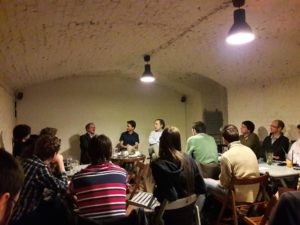 For the first time, Prague EPS Young Minds decided to organise informal events for students to meet with senior academics. Three events in total were held within the Physics Café platform – two open discussions and one pub quiz. All of these were successful beyond expectations, with average attendance of 30 people per an event. The events were advertised in form of posters, which were placed in school buildings. We also advertised it on our social sites, namely Facebook and Twitter.
For the first time, Prague EPS Young Minds decided to organise informal events for students to meet with senior academics. Three events in total were held within the Physics Café platform – two open discussions and one pub quiz. All of these were successful beyond expectations, with average attendance of 30 people per an event. The events were advertised in form of posters, which were placed in school buildings. We also advertised it on our social sites, namely Facebook and Twitter.
The first event was especially challenging for us. Since all the previous Prague EPS Young Minds event were held within the university campus, much effort was put in a search for appropriate café or a similar venue. Once this was covered, our next concern was about the number of people who would attend an event outside the campus. The topic of the first open discussion was “Physics of the 21st Century – What Does It Stand For?” and three scientists took part in it. The event attracted 29 people while about one quarter of the people attending were non-students.
The second Physics Café was organized in the collaboration with the Czech Union of Mathematicians and Physicist. This event was used for the award ceremony and the Union honored their members for their lifetime benefits for the popularization of the physics. It provided great opportunity for informal discussion on the topic “The role of scientist outside of the academic world”.
The last event from the first series of the Physics Café was dedicated to the competition known as Pub Quiz. The questions cover the topic from the world of science, especially they were focused on curious and funny facts from physics. In all cases, the official program was followed by more informal discussions.
In total, three events of the Physics Café were visited approximately by 90 people. This type of event was rated as a good idea and was attractive for students as well as for the senior academics of the Czech Union of Mathematicians and Physicist. Thanks to the positive feedback, there are not doubts, that Physics Café will continue in the future.
Physics for sustainable development & Fund Raising Concert
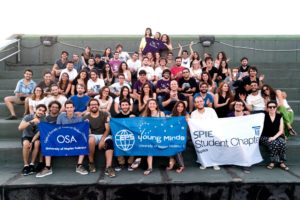 On the 23rd of June PONYS Physics & Optics Naples Young Students organized a fundraising event for the association Sunshine4Palestine. The event had two moments: a talk held by Dr. Barbara Capone from “Roma Tre” University with the title “Physics for sustainable development” and a concert on Physics Department Roof-top performed by “Roof-ini’s quintet”.
On the 23rd of June PONYS Physics & Optics Naples Young Students organized a fundraising event for the association Sunshine4Palestine. The event had two moments: a talk held by Dr. Barbara Capone from “Roma Tre” University with the title “Physics for sustainable development” and a concert on Physics Department Roof-top performed by “Roof-ini’s quintet”.
The theme of the talk, Physics for sustainable development, was very interesting: Dr. Barbara Capone told us Sunshine4Palestine projects. One of the most important was “Jenin Hospital Project”: this project implies the construction and installation of a photovoltaic power generating plant on the roof of the Jenin Charitable Hospital in Gaza. The plant has been specifically designed to cover the energy needs for the entire hospital, and to include storage energy components for emergency purposes.
Some of these projects was consisted with our activities, as, Scientific Divulgation. In collaboration with students from the Applied Science College of the Al-Aqsa University in Gaza, Sunshine4Palestine association will give rise to the first scientific divulgation project in the Gaza Strip. Many small experiments will be conducted, and some groups will work on projects to make the first pieces of what will become the first Science Museum in Gaza. After the talk, The event continued on Physics Department Roof, where the Roof-ini’s quintet’s perfomance entertained the audience and we organized the fundraiser moment for sustain Sunshine4Palestine.
Listening to how you can make your skills available by a scientist to help others has been a great stimulus and exciting for us!
XVII Workshop and Award for young researchers in the field of statistical physics and condensed matter theory
The 17th Workshop and Award for young researchers in the field of statistical physics and condensed matter theory supported by EPS Young Minds Committee was held in Lviv at the Institute for Condensed Matter Physics on June 8–9, 2017. The event was dedicated to the 100th anniversary of Abba Glauberman (1917–1974), a famous Ukrainian physicist who worked in Ivan Franko Lviv State University (1948–1966) and contributed to development of quantum theory of solid state and statistical theory of condensed systems.
Young researchers in statistical physics and condensed matter theory had an opportunity to present their own results during the Workshop as well as compete for the competition prize. This year the reports of participants were particularly striking. Two of them – Olesia Krupnitska and Vasyl’ Kharchenko – were awarded for the best presentations by Special Individual Awards. Four other young participants – Tetiana Rokhmanova, Vasyl’ Vasyuta, Olha Shchur and Oleksiy Zdorevskiy – were distinguished by the Competition Committee as the most promising ones. In general, 22 young researchers not only from Lviv, but from Sumy, Dnipro, Kyiv, Kharkiv – took part in the event.
Five invited lectures were given during the Workshop. In particular, the well-known Ukrainian physicist Stanislav Vilchynskiy presented his overview devoted to generation and evolution of magnetic fields in the early Universe. A special talk about personal and scientific life of Abba Glauberman was given by Correspondent Member of the NAS of Ukraine Ihor Stasiuk. Volodymyr Ponedilok introduced the audience to the activity of Stefan Banach in Lviv. Two other speakers also presented wonderful lectures on other directions of modern statistical and quantum physics.
Besides the official part, some cultural activities were organized, including city sightseeing excursion and evening beer-party. As usual, the Workshop gave a great chance to young and their more experienced colleagues to get in touch, to discuss interesting topics and to enrich scientific connections in friendly atmosphere.
Members of ICMP Young Minds Section in Lviv familiarized the audience with the section’s activities and the general scope of EPS Young Minds Organization.
The photos related to the event can be found on the site of the event:
http://www.icmp.lviv.ua/konkurs/
http://www.icmp.lviv.ua/konkurs/gallery.html
Seminars on nanospectroscopy and novel applications of nanomaterials in catalysis and energy engineering
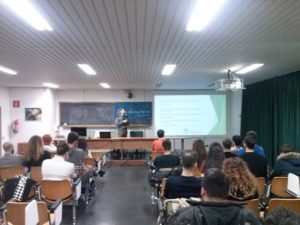 The EPS-YM section of University of Calabria has organized a cycle of seminars on nanospectroscopy and, moreover, on novel applications of nanomaterials.
The EPS-YM section of University of Calabria has organized a cycle of seminars on nanospectroscopy and, moreover, on novel applications of nanomaterials.
The seminar on nanospectroscopy has been focused on the novel concept of “nanospectroscopy” and the speaker has been dr. Antonio Politano.
Methods and techniques to perform spectroscopy with a nanometric spatial resolution and to the investigation and discovery of new phenomena at the nanometer scale at the interface between physics, chemistry and biology have been presented.
In particular, the study of nanostructured materials necessitates analytical methods that combine spectroscopy with electron microscopy. The feasibility of nanospectroscopy at synchrotron radiation sources has been addressed, with some examples of beamlines already open to users.
The seminar on nanomaterials has addressed novel applications recently developed. We have tried to recruit as speakers both PhD stud-ents of other departments and post-doc from our department, under the coordination of Marco Alfano. Nanomaterials can be used for energy engineering as nanofillers in novel Li-ion batteries in order to reduce the problems of silicon microparticles currently used. Furthermore, nanomaterials can be used for devising novel applications in chemical engineering.
During the talk it has been clarified that many critical issues remain unresolved in current energy systems such as low charging rate, low energy and/or power density, poor cycle life, poor thermal management, and low environmental sustainability, impeding broad adoption in new engineering applications. Therefore, the development of new, green materials and technologies is essential to design energy systems with comprehensive out-standing electrochemical, thermal and mechanical properties. In particular, graphene is a suitable platform for electrochemical energy storage and conversion devices. Moreover, scalable production of such energy materials/devices is imperative to realize the transition from laboratory-scale materials to industrial applications.
The participating categories were mainly undergraduate and PhD students.
After the end of the seminar, we have organized a round table of 30 minutes on the problem of energy.
Refreshements with some snacks and beverages have been offered in each seminar.
Career orientation conference for PHD students
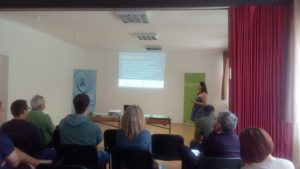 We took part in the organising the seventh DOFFI Conference, which is an event for hungarian PhD students in the field of physics to present their research and to learn about the others’ as well. The annual conference is also a great opportunity for the students to connect and build networks with academics and each other, too.
We took part in the organising the seventh DOFFI Conference, which is an event for hungarian PhD students in the field of physics to present their research and to learn about the others’ as well. The annual conference is also a great opportunity for the students to connect and build networks with academics and each other, too.
The event itself was four days long. Each day was divided into 15-minute sessions. During these sessions the students had 12 minutes to present their work. After that there were 3-minute periods when an assigned discussant, an academic of the student’s field and the audience could analyse and give feedback on the work and presentation.The students could also present their work on posters that were shown throughout the whole conference.
Academics were invited each day to hold plenary lectures about the newest research topics, this year for example about transport properties of graphene-BiTeI hybrid structures and the effect of virtual reality on human balance.
Several companies that employ physicists (e.g. Morgan Stanley) were invited to give presentations on the opportunities a student can get if they choose to work for them.
There was also a forum for discussing the difficulties that affect the community of physisists.
The conference was held in Balatonfenyves, a small town next to lake Balaton, where the participants could relax and go to the beach each day.
We hope that the participants learned a lot, and got to know each other.
Webpage with abstracts, pictures and program:
http://doffi.elte.hu/
Colloquium “Topology in atomic flatland”
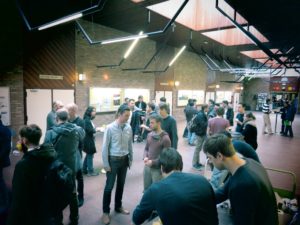 On the 7th of March 2017, the Antwerp Young Minds section invited Professor Doctor Jean Dalibard to give a colloquium at the University of Antwerp about his work on topology-related effects in 2D quantum gases. The target audience were the students and researchers of the University of Antwerp physics department, many of whom attended the lecture.
On the 7th of March 2017, the Antwerp Young Minds section invited Professor Doctor Jean Dalibard to give a colloquium at the University of Antwerp about his work on topology-related effects in 2D quantum gases. The target audience were the students and researchers of the University of Antwerp physics department, many of whom attended the lecture.
Professor Jean Dalibard is a professor at Collège de France and researcher at the Kastler Brossel Laboratory. His research focuses on the study of quantum gases, in particular Bose-Einstein condensates, and explores, among other subjects, the properties of rotating and low dimensional gases. His work on topologic transitions and other topology-related effects in 2D quantum gases served as a very fascinating subject for the colloquium, especially because of its close connection to the 2016 Nobel Prize in Physics.
Professor Dalibard began his talk with a general introduction on the subject of quantum gases in order to make those who might not yet be familiar with these systems acquainted with the topic. Subsequently, he focused on the key aspects of 2D quantum gases such as their topological transition to a superfluid state. He also addressed other topology-related effects in these systems, related to the creation of artificial gauge fields and quantum-Hall type phenomena. The colloquium as a whole was a great occasion for students to be introduced to the concepts of quantum gases, topology and the subject of last year’s Nobel Prize, while at the same time providing the researchers of our department with more profound insights into the underlying theory of these phenomena.
The lecture was followed by a reception, where the audience members and speaker could enjoy a drink and a bite. This also presented our students and researchers with the opportunity to speak with professor Dalibard in a more informal setting than the lecture itself.
The colloquium received a lot of positive feedback from the students and researchers who attended it.
Poster session at the Physics Department
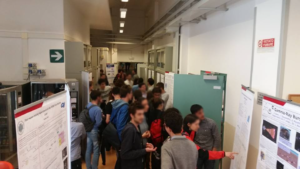 One of the goals of the Young Minds Project is to foster the networking among young researchers
One of the goals of the Young Minds Project is to foster the networking among young researchers
and students. As our first activity, we organized a spring poster session for the master and PhD
students of the Physics Department of the University of Trieste. The poster session took place in
the corridors of the Physics Department on the two days of the presentation to the students of the
Master Course in Physics and during the following week. The posters had, therefore, a high visibility
due both to the high number of people present for the Master Course presentation and to their
location in the core place of the Department’s life.
The posters numbered 16 and were presented by master and PhD students. Among the topics
covered we had high-energy astrophysics, quantum information, chemical evolution of galaxies,
out-of-equilibrium condensed matter, space and satellites physics, density functional theory
calculations, and stabilization of laser cavities. For the PhD students, the poster session has been
very useful to present their work to fellow PhD students and possible bachelor and master students
coming to their labs and groups for their internships or theses. To the master students, it provided
the opportunity to present for the first time their thesis work, a few months before the final
graduation defense.
In addition to the presenting students and to the audience, the activity was welcomed also by the
Professors, who encouraged their students to present a poster on their work. Given the success of
the activity, it will be repeated in late spring 2017.
Strathclyde’s Physics Journal Club
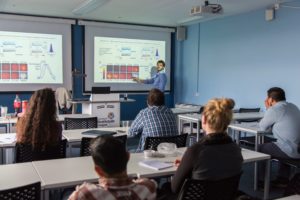 In 2016 Strathclyde SCOPE YM has successfully run the Strathclyde’s Physics Journal Club fortnightly with really good acceptance and collaboration from the students involved. The aim of this activity was to both give the chapter members the opportunity to present some of the relevant papers in their field or more generally in general interest science and also enhance the communication with other students, learning and talking about physics in a relaxed atmosphere. As many of the students were lacking this kind of activities in their own groups, we provided this student-run platform with great success.
In 2016 Strathclyde SCOPE YM has successfully run the Strathclyde’s Physics Journal Club fortnightly with really good acceptance and collaboration from the students involved. The aim of this activity was to both give the chapter members the opportunity to present some of the relevant papers in their field or more generally in general interest science and also enhance the communication with other students, learning and talking about physics in a relaxed atmosphere. As many of the students were lacking this kind of activities in their own groups, we provided this student-run platform with great success.
Throughout the year, we had the chance to learn about a whole variety of physics subjects from quantum optics to optogenetics. The participants ranging from 10 to 20 people with high regularity chaired at least one session during this period. The presentation was usually 20 to 30 minutes long, followed by an informal discussion with some refreshments. During the presentation most of the participants will make use of both whiteboard sketches and projector slides to support their speech. The rest of the students provided some feedback after the presentation helping the speakers improve their weaker points during the presentation.
We consider that this activity was helping to develop a vital skill for junior scientists which is the ability to efficiently analyze and present a high-profile scientific paper. The fact that this activity was held in a student atmosphere helped reducing the fear of some participants to make mistakes and allowed them to expand their knowledge in a much less anxious way.
We regularly asked for feedback to our participants and adapted the sessions to their needs. The atmosphere was really friendly during the sessions and we are certain that this activity will remain valued by the students in the coming years.

